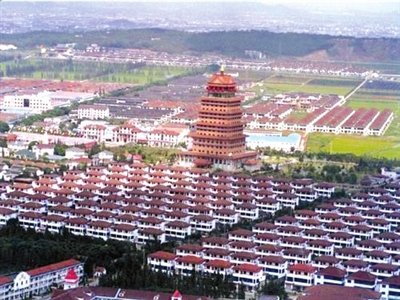Economy
Rags-to-richest village aims still higher
Updated: 2010-12-09 15:28
(Agencies)

Villas are seen in Huaxi village, at Jiangsu province. [file photo]
A massive skyscraper under construction screams for attention, breaking the skyline above the rows of villa homes and picturesque tourist pagodas lining the streets of China's richest village.
Huaxi, a booming market town of 36,000 in East China's Jiangsu Province, is a poster child for economic success in China's modernization drive.
Every family in Huaxi has at least one house, one car, US$250,000 in the bank and enjoys universal health care and free education.
Huaxi's gains come from its unique approach of communal living and investment. Acting almost like a cooperative, residents, who are automatically shareholders, are made to reinvest part of their salary and bonuses back to the commune and the Huaxi group of companies to fuel their village's growth.
"Residents have always been keeping up with the times and looking at how we can transform ourselves, including our economy," said 37-year-old Lu Jianmin, taking a break after work in her three-storey villa home.
Residents credit the pragmatic polices and astute leadership of Wu Renbao, the former party secretary of the village from its founding, for their success.
In 1957, Huaxi had assets of about 1,800 yuan ($240). Today, local officials say assets add up to $6 billion.
The 83-year-old Wu has mostly retired from political life and now acts as an ambassador for the village as well as a living tourist attraction for those seeking to find out how he transformed Huaxi. His son, Wu Xie'en, a successful businessman, was elected to succeed him in 2003.
The village is not taking its success for granted. Fearing complacency, the younger Wu said Huaxi is looking to drop its village label to become a city in the next five years, a move to keep residents on their toes through competitive comparison.
"There is a sense of satisfaction amongst not just the residents in our village but also our management team. Some people felt they have done well enough since our village has achieved so much," Wu said.
"To put it bluntly, it is no longer worthy to compare ourselves with other villages. We do not want this kind of thinking. This would be a roadblock to our development."
From tradition to tourism
Huaxi's growth has seen it absorb neighbouring villages and draw 60,000 migrant workers to work in local businesses.
Though its success was built on traditional industries such as steel and textiles, the village is today in the midst of an economic transformation.
Looking to tap development in the services and tourism sectors, Huaxi has placed big bets on the future.
The 328 metre (1,076 ft) skyscraper under construction, one of the icons for these dreams, is set for completion in the second half of 2011. It will house a five star hotel and offices as well as Asia's largest revolving restaurant.
Huaxi has bought two helicopters and built a helipad base to take visitors for flights around the village from this month. There are also plans for a fleet of 20 airplanes ahead of China's opening up low-level airspace for private flights.
"The greatest advantage of developing tourism is not just its profits, but more importantly it can provide job opportunities for local residents," Wu said.
Officials said the village is now attracting more than 2 million visitors a year from within China and abroad.
Residents are proud of their success but know it hasn't just been handed to them.
"Being proud doesn't mean we are arrogant," said Lu Jianmin. "We feel that the reason we have a high standard of living today is because of our leadership team and also the hard work of the residents."
E-paper

Ear We Go
China and the world set to embrace the merciful, peaceful year of rabbit
Preview of the coming issue
Carrefour finds the going tough in China
Maid to Order
Specials

Mysteries written in blood
Historical records and Caucasian features of locals suggest link with Roman Empire.

Winning Charm
Coastal Yantai banks on little things that matter to grow

New rules to hit property market
The State Council launched a new round of measures to rein in property prices.
